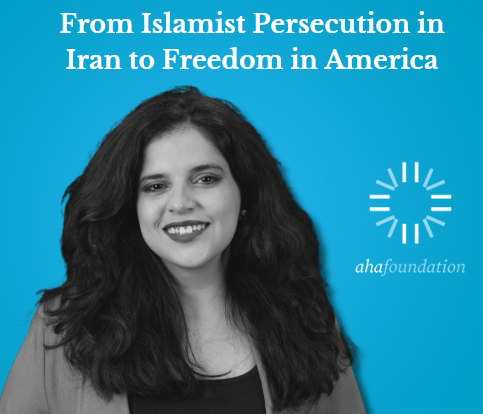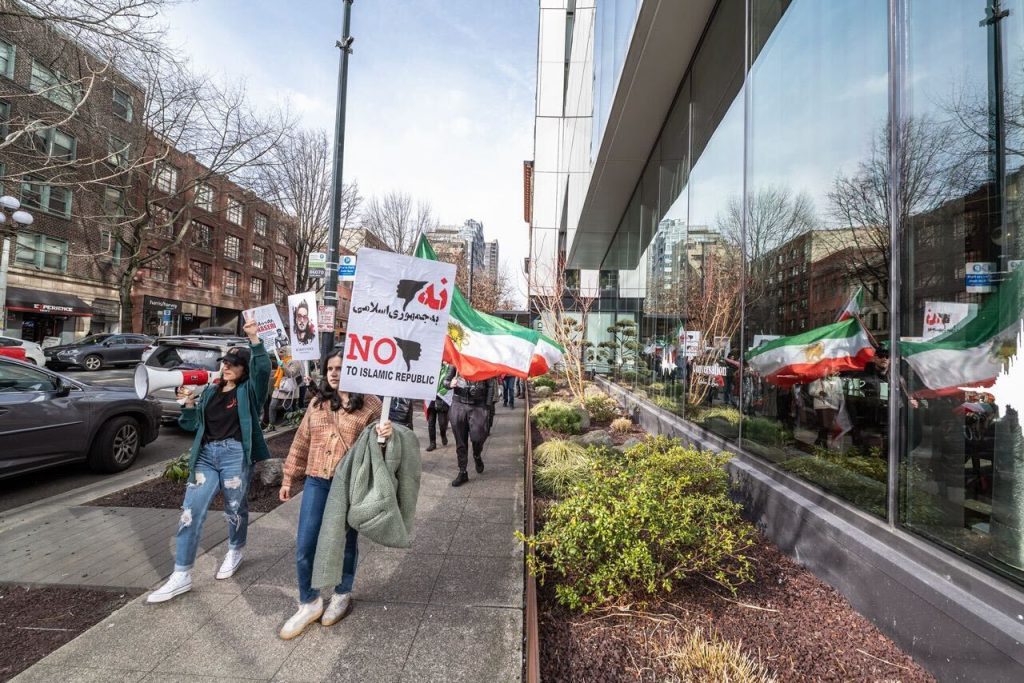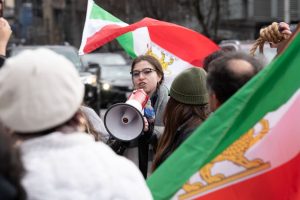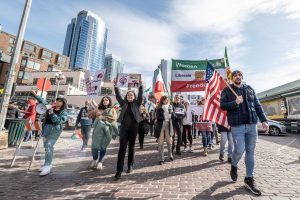From Islamist Persecution in Iran to Freedom in America: A Religious Refugee Turned AHA Intern’s Inspiring Journey

Published on 11/12/24
AHA’s Development Associate and Interim Coordinator of the CLARITy Coalition, Susanna McIntyre, recently had the opportunity to sit down with Golbon Marandiz, a Data Analyst Intern at AHA, who fled Iran with her family as a child. The two originally met through local protests in support of the “Women, Life, Freedom” movement in Iran, which sought to free the people of Iran from the tyranny and oppression of the Islamic Republic, and now work as colleagues to further AHA Foundation’s mission.
Golbon’s story is one of resilience, discovery, and a passionate drive for liberty. Here’s their conversation about Golbon’s journey from being part of a persecuted religious minority to becoming an outspoken advocate for freedom.
“There isn’t any religious freedom in Iran. They consider the Baha’i Faith to be a heretical sect of Islam, which is forbidden…my parents growing up were not allowed to go to college. They were discriminated against in school, often having to sit alone and even facing corporal punishment.”
Susanna: Let’s begin by unpacking a bit about your background. How would you explain what is Baha’ism, or the Baha’i faith? What kind of beliefs do Baha’is have?
Golbon: The Bahá’í Faith originated in 1863 in Persia. It was founded by Baha’u’llah, who was part of the Babi religion. Baha’is consider him a manifestation of God. It’s an Abrahamic religion. Baha’is believe that all religions are one, that mankind is one, and that God is one. Baha’i teachings recognized Mohammad, as well as Moses and Jesus and Zoraster, etc, as prophets of the same God. They believe in unity and that all prophets came to the world for their era to lead the way for that time. Baha’u’llah was the one for our time for the next millennia. After that, there’s going to be another prophet.
Baha’is emphasize serving mankind. They have obligatory prayers once you’re 15 and older, but the way to worship God is through service to humankind. I enjoyed being brought up with these teachings because I think I have a more open mind than most due to my upbringing as a Baha’i. I enjoyed learning about different religions and the different messages each prophet brought to the world.
Our Sunday school focused on what they call virtues-characteristics they want you to work on to be better humans, like honesty and patience. At 15, you get to decide if you want to be a Baha’i or not.
“My grandparents’ burial sites were bulldozed over and new developments were built. Baha’is are often heavily persecuted and jailed under the false accusation of being Israeli spies, because the Baha’is have a temple in Haifa, Israel.”
Susanna: How are Baha’is systematically persecuted in the Islamic Republic?

Standing strong against oppression—Golbon, on the right in a brown jacket, joins the fight for freedom and justice for the people of Iran by protesting in Seattle, Washington. Photo Credit: Homayoun Amir Yeganeh
Golbon: They are not given any rights at all. There isn’t any religious freedom in Iran. They consider the Baha’i Faith to be a heretical sect of Islam, which is forbidden. Baha’is are not even recognized as a religion in the Islamic Republic. They’re considered dirty and foreign, not accepted at all into Islamic Republic’s society.
For example, my parents growing up were not allowed to go to college. They were discriminated against in school, often having to sit alone and even facing corporal punishment. My father was a businessman in Iran, which is nearly impossible for a Baha’i.
Many people lay low over there. They don’t even let you be at peace after death. My grandparents’ burial sites were bulldozed over and new developments were built. Baha’is are often heavily persecuted and jailed under the false accusation of being Israeli spies, because the Baha’is have a temple in Haifa, Israel. The community has kept an amicable connection with the Israeli government and because of that, they have been targeted. They make it impossible to live as a Baha’i. It’s so difficult to live as a Baha’i that we had to leave.
Susanna: How old were you when you and your family came to America?
Golbon: I was five years old when my family came to the United States as religious refugees. Thankfully my parents saved me from a life of indignity.
“It was really difficult. As soon as I stepped into Imam Khomeini airport, I truly felt my life could be in danger. I had been coached on what to say at the gate.”
Susanna: What did you learn from your parents about American civic values and liberties? How was it meaningful to them?
Golbon: I learned that a good society is pluralistic. It’s good to have different viewpoints and you need freedom of expression to actually be free. I learned from my community to accept differences and be open. Another thing I learned from my parents is that in America, you can actually change your life. There’s no hope under a regime, but in a free society in the Western world, there is hope. You aren’t tied to what has been.
“Going back to Iran and coming back just made me more vocal about how proud I am to be in the U.S. and more grateful that I am here.”

Susanna McIntyre, AHA Foundation’s Development Associate, at a protest in Seattle rallying in solidarity with the Women, Life, Freedom movement, raising her voice for justice, equality, and human rights in Iran. Photo Credit: Homayoun Amir Yeganeh
Susanna: Later, as you got older you eventually traveled back to Iran. What were your experiences like and what did you learn? What was your experience like wearing forced hijab? (Iran and Afghanistan are currently the only countries that legally mandate all women, including non-Muslim women, to wear the hijab)
Golbon: It was really difficult. As soon as I stepped into Imam Khomeini airport, I truly felt my life could be in danger. I had been coached on what to say at the gate. While things got a little smoother throughout the trip, that initial feeling stayed with me. I still felt like I couldn’t say or do what I wanted anywhere. I did love seeing family and friends, but I also saw how sad society had become there, and how people struggled under the bad economy.
Going back to Iran and coming back just made me more vocal about how proud I am to be in the U.S. and more grateful that I am here. I’m definitely grateful that I was able to go back to visit Iran at one point because that’s never going to happen again.
Wearing forced hijab was really uncomfortable. I feared that my hijab could fall off at any second. My cousins told me to lighten up, because I was wearing it so tightly and they weren’t covering as much as I was, but I was scared. At first, I thought I looked pretty, but then I realized I didn’t have a choice. It was difficult, especially remembering how my mom’s demeanor completely shifted once she was able to take off her hijab at the Turkish airport.
“It became obvious to me that people in America did not know what was going on back home. That made me more informed and outspoken.”
Susanna: What awoke your activism, your passion for liberty, and your outspokenness towards Islamism?
Golbon: It really started in November 2019, during Bloody November. This was a series of nationwide protests in Iran triggered by a sudden fuel price hike, which led to a vicious government crackdown resulting in hundreds of civilian deaths and a total internet blackout.
I was on Twitter and saw videos of protests in Tehran and people dying. I was exposed to different perspectives, including what in Iranian circles we refer to as the “Reformists,” who make it appear as if they are advocating for changes within the Islamic Republic’s existing system. I didn’t like what they were saying because it sounded apologetic for the Islamic Republic’s actions.
I went down that rabbit hole, reading more about the Islamic Republic, its lobbies, and the tactics used in media and propaganda around the world. When Qassim Soleimani [the head of the Quds Force within the Islamic Revolutionary Guard Corps (IRGC), responsible for the Islamic Republic’s extraterritorial military operations and clandestine activities] was assassinated under the Trump administration, I got into it even more. I saw a disconnect between what was happening in Iran versus what people were saying here.
It became obvious to me that people in America did not know what was going on back home. That made me more informed and outspoken. When the “Women, Life, Freedom” movement occurred, and the more misinformation I saw, the more enraged I was and the more I felt we needed to speak out about this.
“Tens of thousands were imprisoned and hundreds of civilians were killed, including children. Iranians around the world started coming together and protesting as well. To me, “Women, Life, Freedom” is liberty. It’s a call for secular democracy, freedom of speech, free markets and freedom of expression.”
Susanna: Can you give a broad overview of the “Women, Life, Freedom” movement and what it meant for you?
Golbon: Mahsa Amini was murdered by the Morality Police on September 16th, 2022. She was a 22-year-old Kurdish woman visiting Tehran, and she was arrested and beaten so badly for having a few pieces of hair showing that she died. This awakened a huge movement against the regime in Iran.
Women were leading these protests, which eventually led to the Woman, Life, Freedom [translated from the Persian chant of “Zan, Zendegi, Azadi”] revolution. People were protesting day and night, withdrawing their funds, rallying physically, burning their hijabs, and hacking government sites.
Tens of thousands were imprisoned and hundreds of civilians were killed, including children. Iranians around the world started coming together and protesting as well. To me, “Women, Life, Freedom” is liberty. It’s a call for secular democracy, freedom of speech, free markets and freedom of expression. These are the basics of a free society.
The protestors don’t want foreign intervention, they want foreign countries to stop enabling their oppressors by validating and negotiating with them. It’s been a woman-led movement, and sadly, many people are still dying today in political executions.
“What people in the West don’t understand is that labeling everyone who criticizes Islamism as ‘Islamophobic’ just works to invalidate the ‘Islamo-trauma’ that many of us have endured at the hands of Islamists for generations. This rhetoric is harmful; it invalidates survivors by accusing them of bigotry and makes Islamism inaccessible to any criticism.”
Susanna: In your experience as a survivor of Islamist persecution, what frustrates you about what people in the West don’t understand?

Golbon, in the brown jacket holding a green jacket, stands proudly in support of the Women, Life, Freedom movement, joining others to call for justice and freedom in Iran. Photo credit: Homayoun Amir Yeganeh
Golbon: What people in the West don’t understand is that labeling everyone who criticizes Islamism as “Islamophobic” just works to invalidate the “Islamo-trauma” that many of us have endured at the hands of Islamists for generations. This rhetoric is harmful; it invalidates survivors by accusing them of bigotry and makes Islamism inaccessible to any criticism. These false accusations fuel the Islamists even further by doing the work of silencing dissidents for them. Almost like their own version of morality policing.
Susanna: I agree with you and I think about this a lot in regard to this attitude of appeasement towards Islamists, particularly the Islamic Republic of Iran. It drives me crazy because how are we benefiting from appeasing them? One thing that I appreciate, that Ayaan [Ayaan Hirsi Ali, founder of AHA Foundation] talks about a lot in her books, is this idea of “root causes.” Many Western intellectuals want to believe from a rationalist perspective that all this hatred and violence afflicted upon innocent people has a “root cause” that is somehow understandable and rational, such as historical grievance or geopolitics. But what we need to understand is that to an Islamist, the existence of our liberties itself is the provocation. There is no other provocation needed. Islamism cannot tolerate pluralism, which is one of the values that is critical for people from religious minorities like yourself to survive.
Golbon: Yes, exactly, that is why coexistence is so important to me.
Susanna: What attracted you to AHA Foundation, and is there anything specifically that inspired you about AHA’s work or Ayaan specifically?
Golbon: I learned about Ayaan a while ago through Jordan B. Peterson and then refreshed through you. What really drew me to her was her work as an ex-Muslim against extremism. I resonated with that because I also hate extremism and have been a victim of it. I feel like AHA is really aligned with my own values, and I want to dedicate my life to preserving liberal values. That’s how I’m able to exist and survive.
Susanna: Finally, what do you hope to do in your future?
Golbon: I’m still figuring that out, but I see myself working in policy and cybersecurity. I really want to work in the realm of free speech and free internet.
Susanna: That’s awesome. Thank you. Is there anything else you want to add?
Golbon: No, thank you.

